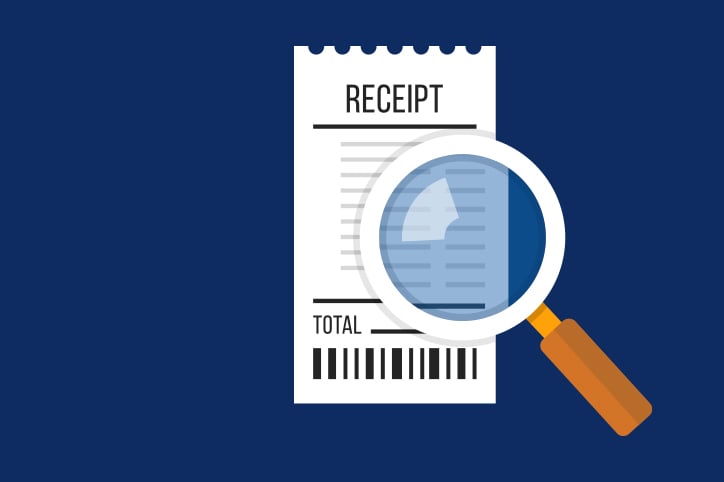Prevent Fraudulent Expense Reports Before They Happen

No one wants to worry about employee expense fraud, or think that it’s happening in their company. Unfortunately, fraudulent expense reporting does happen. Sometimes it’s by accident—an employee misinterprets your policy. But in other cases, they’re trying to cheat your system.
Types of expense reporting fraud
The Association of Certified Fraud Examiners (ACFE) breaks down expense reporting fraud into four categories:
- Multiple reimbursements: employees turn in two or more reimbursements for the same purchase. This can be an innocent mistake—an employee forgets that they received a reimbursement, and they include the purchase on their next expense report. It can also be a scheme where multiple employees submit reimbursements for the same thing, and even use different documents to show proof-of-purchase.
- Fictitious expenses: an employee makes up a purchase, then submits an expense report for reimbursement. This can happen in a situation where an employee enrolls in coursework the company reimburses for, de-enrolls, but submits a copy of the bill anyway.
- Overstating expenses: an employee makes a business purchase, but seeks reimbursement for more than they spend. This can happen when employees use cash, or if you aren’t strict about receiving receipts.
- Mischaracterizing expenses: an employee claims a personal expense is a business one. This can happen if you allow employees to purchase their own office furnishes or supplies, and when they pay for gifts or meals for clients.
The good news, according to the ACFE, is that expense reporting fraud is at the low-end of occupational fraud risks. But it’s still costing companies a median of $31,000 a year—losses that cut into plenty of bottom lines.
How can you prevent fraudulent expense reporting?
Below, we explore three areas to watch, and offer tips that can help you tighten the way you manage expense reporting.
Expense report fraud doesn’t have to happen at your company. ExpenseWire makes it easy for employees to upload receipts in real time, adhere to the company’s expense policy, and much more. Request a demo, and learn more today.
Prevent expense fraud
Whenever you lose money due to any type of fraud, it can be a burden on business. As you keep an eye on expense reporting fraud, here are three things to watch:
1. Are employees padding add-ons when they fly?
Keeping track of air travel can be a challenge. There are costs associated with baggage, meals, beverages, in-flight entertainment, seat upgrades and more. If your company doesn’t set a clear distinction between business and personal expenses when flying, things can be even more confusing.
- Do you reimburse for economy class tickets only? What about upgrades to business class?
- What about the in-flight movie, sandwich, and beverage? What if your employee uses the company card for these, even if they count as personal expenses?
2. Are they misinterpreting your policy about business purchases or travel expenses?
We mentioned above that some employees try to claim personal purchases as business expenses. Whether these are honest mistakes or not, if your expense policy leaves too much room for interpretation, you can be creating a situation that invites fraud.
- Maybe their new desk lamp is for their home. Is their new club membership really for networking? And how about the “business development” dinner they had with friends?
- Let’s say they use a business trip as a way to go sightseeing, or visit an old friend. Does your expense policy specify how they should report personal miles while they’re away?
3. Are they over-claiming actual out-of-pocket expenses?
An employee takes a would-be client out to dinner, and picks up the tab. No big deal. But what about the cash tip?
- Without a way to track the tip, what’s stopping them from over-claiming?
- Gasoline purchases is another way that some employees try to sneak a little extra onto their expense report. This is especially easy to do if they pay with cash, lose their receipts, or try to pull the actual cost out of thin air days later.
Resolving expense reporting fraud can be tricky.
If your expense report policy leaves too much room for interpretation, this can lead to fraudulent reporting.
One way to cut down on fraudulent expense reports is to start with essential questions about your people, and how they approach your existing policy:
- Has there been a rash of fraudulent expense reports? Or, has accounting been rumbling about some reports that seem off?
- Are issues coming up in one or two departments? Which ones? Is it because they travel more? Or does it have to do with the department’s culture?
- Is there a management issue at play? What type of accountability measures are in place to correct expense report fraud when it happens?
From there, look for ways to tighten the language of your expense policy:
- Do you have specific guidelines about what employees can spend, and how they can spend it?
- Does your policy use language that invites interpretation? For instance, do you have a “suggested per diem” of $50? What would happen if your language was more direct, such as “per diem not-to-exceed $50”?
- What recourse do employees face when they step out-of-bounds of your policy? Is it a slap on the wrist? A shrug? What dissuades them from doing it again?
Expense reporting software can help you prevent fraud from happening.
A digital travel and expense management solution can help make it easier for employees to stay accountable.
- With expense reporting software, employees can upload receipts, and attach them to expense reports. This helps eliminate issues with lost or forgotten receipts. And, an automated system gives managers insight into expenses as they happen.
- Key features and built-in warnings help employees stay within policies and spending limits—from how much they can spend, to what actually counts as a business purchase.
- Expense reporting software can also help departments build estimates that reflect true costs in locations where employees shop or travel. This can help eliminate ambiguities related to things like gasoline prices, hotel taxes, costs of entertainment and more.
The majority of your employees want to turn in accurate expense reports. Expense reporting software can help them do so. And, it can help prevent other employees from taking advantage of gaps, loopholes, or places where your expense policy is vague.
If your employees are tracking expenses on paper or spreadsheets, then you might be creating a situation that invites fraud. An expense reporting solution such as ExpenseWire helps you shore up your systems, and gives employees new ways to stay accountable with their business purchases. Contact us for a free demonstration of our mobile expense management system.

